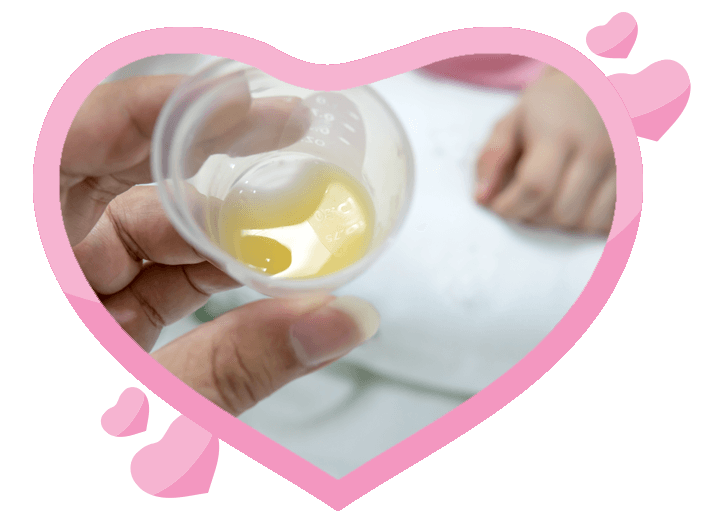Everything you need to know about Colostrum
Know about the nutrient rich pre-milk that helps babies fight infections.

Benefits of Colostrum for Babies
At the start of the breastfeeding process, Colostrum is the first milk your baby tastes. Colostrum begins getting produced during pregnancy until your baby is born. It lasts for several days after pregnancy. In the early few days of your baby’s life, getting Colostrum is essential. Colostrum is a nutrient-rich pre-milk with immune-boosting compounds that your baby would need to fight infection.
This pre-milk does not have a uniform texture for all women. For some women, it is thick and yellowish. For others, it is thin and watery. The flow of Colostrum is slow, and for a good reason. The milk is concentrated, and a baby should not take more than a teaspoon of it at once.
After 3-4 days of making Colostrum, your breastmilk’s texture will change, signaling the end of colostrum production. Your breasts will feel firmer, and the rate of milk flow in your breast should increase. In some women, it may take longer for Colostrum to stop being produced. It is best to notify your doctor if the production continues for more than four days.
9 Benefits of Colostrum for Babies
It Fights Infection
Sometimes called ‘liquid gold,‘ Colostrum is what your baby needs from suffering an infection that could be fatal in the first few days of being born. It is made of components that help fight off disease, illness, and infection.
Secretory Immunoglobulin A (IgA) is a particular type of immunoglobulin that your baby needs on being born. Your baby is born with low levels of IgA. Colostrum contains high immunoglobulin levels, which is critical to your baby’s ability to stave off infections a few days after being born. Its job is to seal and coat your baby’s intestinal and respiratory tract from invasive germs.
By the time colostrum flow stops, however, your baby’s body should be making its own IgA at the volume needed to keep being safe.
It Supports the Immune System
A baby’s immune system is not as strong as an adult’s and would find it difficult to fight off germs should they invade. Colostrum provides additional support to the immune system via protein compounds such as Lactoferrin – a protein that helps your immune system respond to infections.
It is also rich in antibodies, which are protein compounds that help the immune system fight disease. Antibodies are also known as immunoglobulins, and Colostrum has two important ones that your body needs; IgA and IgG.
It Prevents Jaundice
Colostrum protects your baby’s tummy from upset, and in a similar light, serves as a laxative to help your baby poo frequently as that age requires. Pooing often helps your baby get rid of substances they might have ingested while in the womb. The stool has the appearance of being dark and sticky.
Colostrum’s function of getting babies to poo frequently helps prevent jaundice. Jaundice is caused by improper egestion or lack of bilirubin in the body. Bilirubin is a product caused by the breakdown of red blood cells, which babies have a lot of at birth to take oxygen around their body, in body.
If a baby’s liver cannot process the bilirubin, it builds up in the body, leaving only Colostrum’s laxative effect to help get it out and prevent jaundice.
It is Vitamins and Minerals rich
Colostrum is rich in essential minerals and vitamins needed by your baby to stay healthy and grow gracefully. Compared to mature milk (milk produced after Colostrum’s production has ended), it is high in magnesium (which supports your baby’s heart), sodium chloride, and lower potassium and calcium levels. Zinc is present, too, aiding brain development.
Colostrum is rich in nutrients too. The carotenoids and vitamin A give it a yellowy appearance. Its nutritional content, however, is determined by the baby’s mother. Studies show the level of vitamin B and vitamin D, two common vitamins found in Colostrum, are determined by the mother’s intake of these vitamins.
It Helps in Growth and Development
Colostrum has properties that help your newborn baby grow and develop into that bubbly kid who would soon be able to say ‘mommy.’ Colostrum is high in protein, vital for growth. Colostrum has been discovered to bear some semblance to the amniotic fluid babies feed on in the womb, making it easy to develop in the outside world.
Expressing Colostrum
Just as you can do with mature milk, Colostrum can be expressed and fed to a baby using a bottle. We have described below when to start doing this, the steps to express Colostrum, and how you would store the milk.
When to Start Expressing
If it is expected that a baby might not breastfeed after being born, antenatal milk expression is advised. Babies can avoid being nourished on infant formula this way.
For proper growth and development, babies should begin their feeding journey in the outside world with breast milk. Expecting mothers should check with their midwives or doctor, but generally, after 36 weeks of gestation, it is customarily safe to begin expression.
Steps to Express
The steps you can take to express Colostrum successfully are:
- Wash your hands before expressing
- Take a warm bath before expressing
- Be in a comfortable position before you begin expressing.
- Encourage the let-down reflex by massaging your breast gently from the back towards the nipple.
- Cup your breast in a ‘C’ shape with your thumb and a few fingers.
- Press towards your chest, and release.
- Do this rhythmically to get the milk flowing.
- Spend 3-5 minutes doing this on each breast. Then go up to ten minutes.
- Use a sterile syringe to take the colostrum drops.
- Each syringe you use should not be full to create an allowance for the expansion of the milk.
You can do this up to twice a day.
Storage
Ensure your colostrum-filled syringes are labeled with the exact date and time they were expressed, along with your initials for easy identification. It would help if you refrigerated the expressed Colostrum immediately you express.
Within 24 hours of refrigerating, the Colostrum should be kept in a zip-lock bag and frozen up. It can be stored in a chest freezer for 6-12 months, and in an upright or fridge-freezer, for around three months.
Bottom Line
Colostrum is vital to your baby’s all-around wellness. It is critical to their growth and development that they have it immediately it is possible.
More For You!
Baby Gear
- Best Changing Table
- Best Strollers
- Best Cribs
- Best Car Seats
- Best Essentials Checklist
Game On Mommy
© Copyright 2020 by Gameonmommy.com. All rights reserved. We are a participant in the Amazon Services LLC Associates Program, an affiliate advertising program designed to provide a means for us to earn fees by linking to Amazon.com and affiliated sites.





